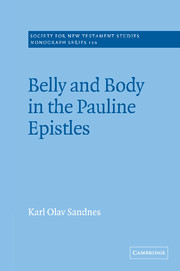Book contents
- Frontmatter
- Contents
- Preface
- Abbreviations
- Part 1 Prolegomena
- Part 2 The Graeco-Roman belly
- Part 3 The appropriated belly
- Part 4 Belly-worship and body according to Paul
- Part 5 The earliest expositors of Paul
- Part 6 Conclusions
- Bibliography
- Index of modern authors
- Index of Graeco-Roman sources
- Index of Old Testament, Apocrypha, Pseudepigrapha and other Jewish writings
- Index of New Testament and early Christian writings
Part 4 - Belly-worship and body according to Paul
Published online by Cambridge University Press: 22 September 2009
- Frontmatter
- Contents
- Preface
- Abbreviations
- Part 1 Prolegomena
- Part 2 The Graeco-Roman belly
- Part 3 The appropriated belly
- Part 4 Belly-worship and body according to Paul
- Part 5 The earliest expositors of Paul
- Part 6 Conclusions
- Bibliography
- Index of modern authors
- Index of Graeco-Roman sources
- Index of Old Testament, Apocrypha, Pseudepigrapha and other Jewish writings
- Index of New Testament and early Christian writings
Summary
As we have pointed out, the Pauline texts on ‘serving the belly’ or those ‘whose god is their belly’ are very brief, polemical and in coded language. It is, therefore, difficult to ascertain their precise meaning and to glean information from them. Having now completed a presentation which provides access to an assumed cultural competence on the part of Paul's readers, it is time to approach the Pauline material directly. In reading these texts we cannot avoid the background material presented in the previous chapters. In order to read Paul's texts in a culturally adequate way, we need to be guided by this material. The brevity of his sayings demands this. It now remains to see in what way this ancient material is appropriated in Paul's writings, and to which elements he gives emphasis. This means that there must be an interchange between background material, without which the Pauline texts remain enigmatic and obscure, and the Pauline texts themselves.
We have found that belly-worship or enslavement to the stomach is firmly rooted in moral philosophical discussions on mastering the desires. According to Hellenistic-Jewish material, the Law was seen as a superior means of controlling the passions. The Law is given to fight the desires. Paul also has a concern for self-mastery. His letters demonstrate his familiarity with the language and motives associated with mastery of passions. Terms like ἐγκράτɛια, πάθος, ἐπιθυμία, ἀνδρίζɛσθαι, ἡδονή, αὐτάρκɛια and their cognates occur frequently and with great emphasis in the Pauline epistles.
- Type
- Chapter
- Information
- Belly and Body in the Pauline Epistles , pp. 133 - 135Publisher: Cambridge University PressPrint publication year: 2002



